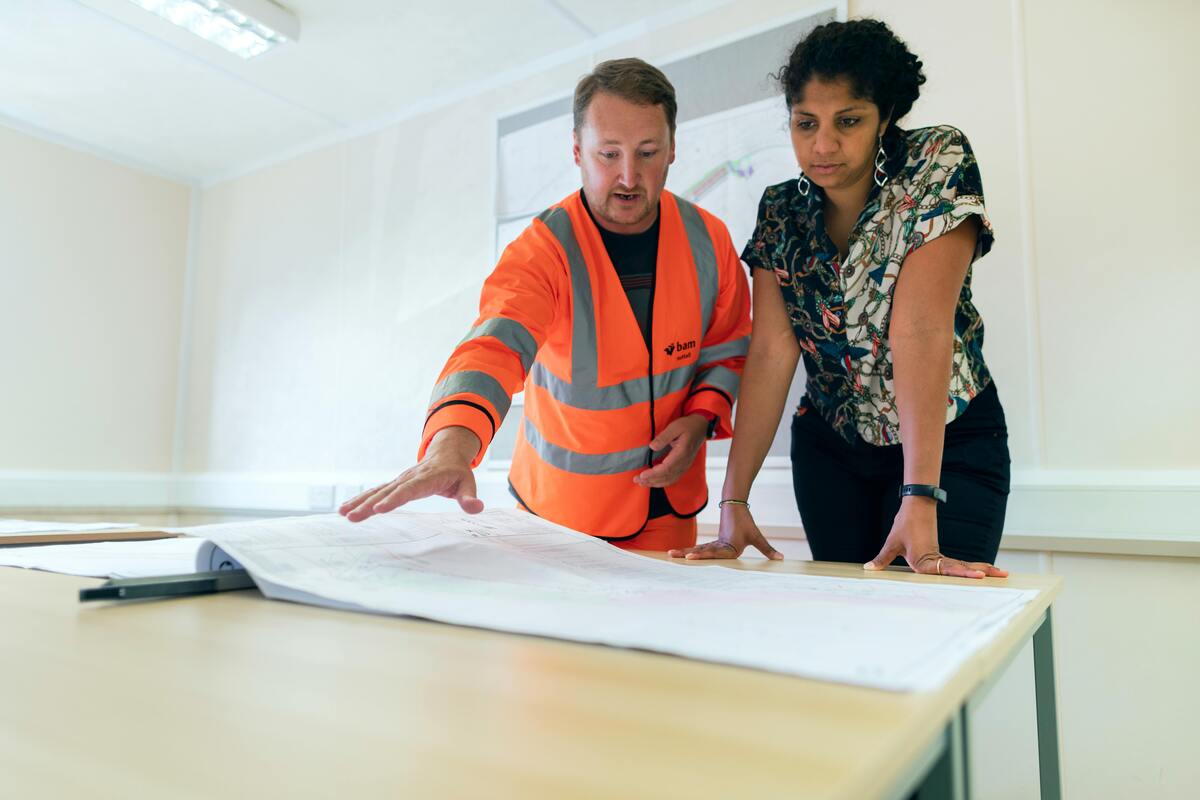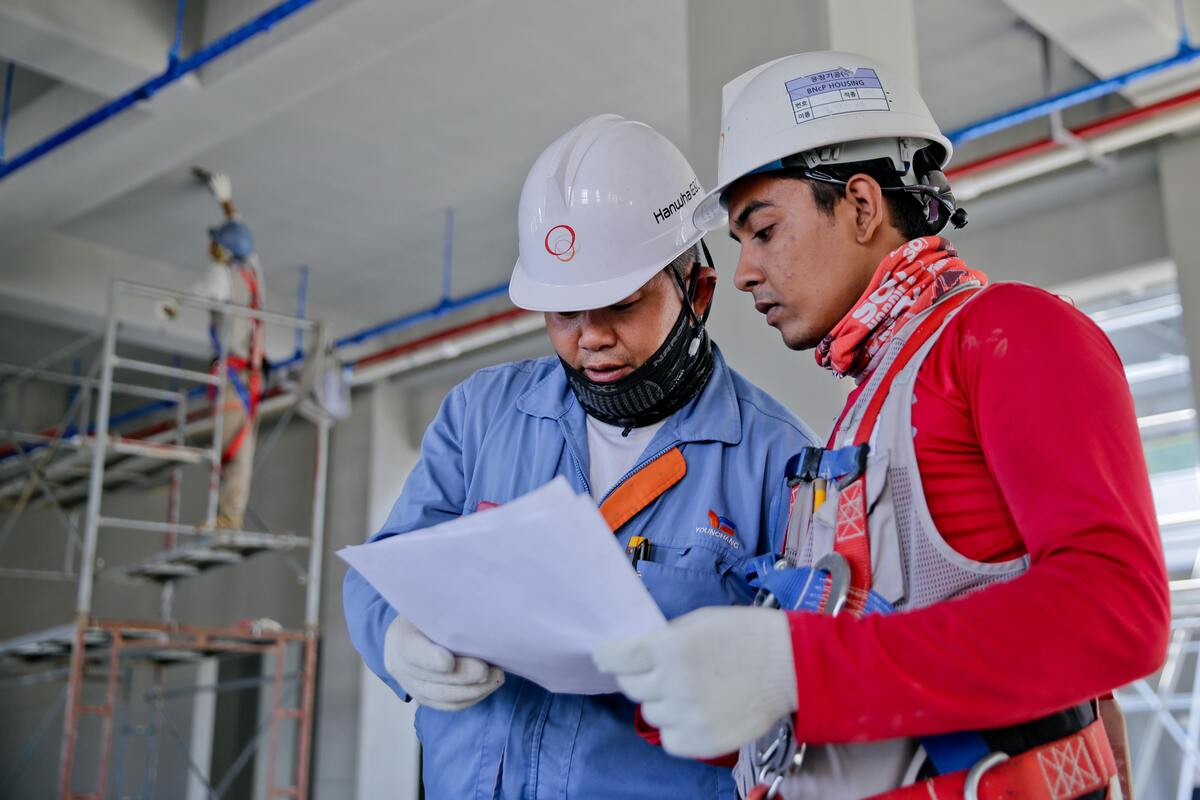Updated by Nazanin Ghodsian, 05/01/2025
LCA analytics in construction is becoming a vital tool for increasing sustainability and decreasing environmental impact as the construction sector develops. Buildings account for 30% of greenhouse gas emissions and 40% of world energy use. LCA (Life Cycle Assessment) Analytics offers a methodical way to evaluate the environmental impact of construction projects throughout their whole lifecycle. LCA Analytics empowers stakeholders to make well-informed decisions that improve sustainability, efficiency, and cost-effectiveness by employing data-driven analysis and predictive modeling.
We look at the many advantages of LCA analytics in construction in this in-depth analysis, including reduced costs, lessened environmental effect, and enhanced stakeholder participation. Through the optimization of resource allocation, material selection, and project management, LCA Analytics is revolutionizing the construction sector. This guide explores how LCA Analytics is enabling a more resilient and sustainable built environment through practical examples and perceptive analysis. Discover practical methods for incorporating LCA analytics in construction projects and how these tools are propelling the industry’s transition to greener practices.
Table of Contents
An Overview of LCA Analytics in Construction
Life Cycle Assessment (LCA) Analytics is a vital tool revolutionizing the construction industry’s approach to sustainability, efficiency, and cost-effectiveness. LCA Analytics involves the comprehensive evaluation of a building project’s environmental impact throughout its entire lifecycle, from material extraction and production to construction, operation, and eventual demolition or reuse.
In construction, LCA Analytics integrates complex data sets and advanced analytical techniques to assess various environmental factors, including carbon emissions, energy consumption, resource depletion, and waste generation. By quantifying these aspects, stakeholders gain valuable insights into the environmental footprint of their projects, enabling informed decision-making and strategic planning.
One of the primary benefits of LCA Analytics in construction is its ability to identify opportunities for cost reduction. By analyzing different materials, construction methods, and operational practices, LCA Analytics helps optimize resource utilization, minimize waste, and lower overall project expenses.
Moreover, LCA Analytics plays a pivotal role in enhancing sustainability efforts within the construction industry. By pinpointing environmentally friendly alternatives and guiding the selection of eco-conscious materials and processes, LCA Analytics supports the achievement of sustainability goals and certifications, such as LEED (Leadership in Energy and Environmental Design).
Furthermore, LCA Analytics facilitates regulatory compliance by ensuring that construction projects adhere to environmental standards and regulations. By proactively addressing environmental concerns and demonstrating compliance with applicable laws, stakeholders can mitigate risks and avoid potential penalties.
LCA Analytics is a powerful tool driving positive change in the construction industry. By enabling stakeholders to make data-driven decisions, optimize resource allocation, and prioritize sustainability, LCA Analytics paves the way for a more environmentally responsible and economically viable approach to construction projects.
Suggested article to read: Decarbonizing Construction; A Sustainable Future Ahead (2025 Solution) | Carbon Neutral vs Net Zero Construction; 2025 Comparison

1. Cost Reduction
One of the most significant benefits of employing Life Cycle Assessment (LCA) Analytics in construction is the substantial potential for cost reduction throughout the project lifecycle. By systematically analyzing various aspects of construction projects, LCA Analytics identifies opportunities to optimize resource allocation, minimize waste, and streamline operational processes, leading to significant savings for stakeholders.
- Optimized Material Selection: LCA Analytics enables a detailed comparison of different materials based on their environmental impact and cost-effectiveness over the entire lifecycle. By selecting materials with lower environmental burdens and lifecycle costs, construction projects can achieve cost savings without compromising quality or performance.
- Efficient Resource Utilization: Through LCA Analytics, construction teams can identify inefficiencies in resource utilization and implement measures to improve efficiency. By optimizing resource consumption, such as energy, water, and raw materials, projects can reduce operational costs and enhance overall sustainability.
- Waste Minimization: LCA Analytics helps identify opportunities to minimize waste generation throughout the construction process. By implementing strategies to reduce, reuse, and recycle materials, projects can lower disposal costs and minimize the environmental impact associated with waste management.
- Energy Efficiency: LCA Analytics enables the evaluation of energy consumption across different stages of a construction project, from material extraction to building operation. By identifying energy-intensive processes and implementing energy-efficient technologies and practices, projects can reduce operational costs associated with energy consumption.
- Lifecycle Cost Analysis: LCA Analytics provides insights into the long-term costs associated with different design and construction choices. By considering lifecycle costs, including maintenance, operation, and end-of-life disposal, stakeholders can make informed decisions that optimize total project costs over its lifespan.
- Risk Mitigation: By identifying potential cost drivers and risks early in the project lifecycle, LCA Analytics helps stakeholders develop proactive mitigation strategies. By addressing risks promptly, projects can avoid costly delays, rework, and disputes, leading to overall cost savings.
- Competitive Advantage: Construction projects that leverage LCA Analytics to achieve cost reductions gain a competitive edge in the market. By offering cost-effective and sustainable solutions, projects can attract clients, investors, and partners who prioritize efficiency and environmental responsibility.
In conclusion, the cost reduction benefit of LCA Analytics in construction is multifaceted, encompassing optimized material selection, efficient resource utilization, waste minimization, energy efficiency, lifecycle cost analysis, risk mitigation, and competitive advantage. By harnessing the power of LCA Analytics, construction projects can achieve significant cost savings while advancing sustainability goals and delivering value to stakeholders.
Suggested article to read: Sustainable Construction Technology; Ultimate Guide in 2025 | Building Decarbonization; 2025 Guide
2. Environmental Impact Mitigation
Life Cycle Assessment (LCA) Analytics serves as a potent tool in mitigating the environmental impact of construction projects, offering various strategies to minimize carbon emissions, energy consumption, resource depletion, and waste generation. By systematically evaluating the environmental footprint of construction activities, LCA Analytics empowers stakeholders to make informed decisions that prioritize sustainability and minimize adverse environmental effects.
- Carbon Emission Reduction: LCA Analytics enables the identification of processes and materials that contribute most significantly to carbon emissions throughout the project lifecycle. By selecting low-carbon alternatives, optimizing transportation logistics, and incorporating renewable energy sources, construction projects can significantly reduce their carbon footprint, contributing to climate change mitigation efforts.
- Energy Efficiency Improvements: Through LCA Analytics, construction teams can assess energy consumption patterns and identify opportunities for efficiency improvements. By implementing energy-efficient technologies, such as high-performance insulation, LED lighting, and smart building systems, projects can reduce energy demand and minimize environmental impact while lowering operational costs.
- Resource Conservation: LCA Analytics facilitates the evaluation of resource consumption across different stages of a construction project. By prioritizing materials with minimal environmental impact and maximizing resource efficiency through recycling and reuse, projects can conserve natural resources, minimize habitat destruction, and mitigate ecosystem degradation.
- Waste Minimization and Recycling: LCA Analytics aids in identifying opportunities to minimize waste generation and optimize waste management practices. By implementing strategies such as material optimization, prefabrication, and construction waste recycling, projects can divert waste from landfills, reduce pollution, and conserve valuable resources.
- Water Conservation: LCA Analytics extends beyond energy and materials to assess water usage throughout the construction lifecycle. By incorporating water-saving technologies, such as low-flow fixtures, rainwater harvesting systems, and drought-resistant landscaping, projects can minimize water consumption and alleviate pressure on local water resources.
- Biodiversity Preservation: Through comprehensive lifecycle analysis, LCA Analytics considers the indirect environmental impacts of construction activities on biodiversity and ecosystem health. By adopting sustainable land-use practices, minimizing habitat destruction, and restoring natural habitats, projects can help preserve biodiversity and enhance ecological resilience.
- Regulatory Compliance and Certification: LCA Analytics assists construction projects in meeting regulatory requirements and obtaining sustainability certifications, such as LEED and BREEAM. By ensuring compliance with environmental standards and demonstrating commitment to sustainable practices, projects can enhance their reputation, attract investors, and access new markets.
In conclusion, environmental impact mitigation with LCA Analytics in construction encompasses a range of strategies aimed at reducing carbon emissions, conserving resources, minimizing waste, preserving biodiversity, and promoting regulatory compliance. By integrating sustainability considerations into decision-making processes, construction projects can minimize their environmental footprint and contribute to more sustainable buildings.
3. Improved Decision Making
Life Cycle Assessment (LCA) Analytics empowers stakeholders in the construction industry to make informed decisions by providing comprehensive insights into the environmental, economic, and social impacts of various design, construction, and operational choices. Through data-driven analysis and predictive modeling, LCA Analytics enhances decision-making processes, leading to more sustainable, cost-effective, and socially responsible outcomes.
- Data-Driven Insights: LCA Analytics leverages vast datasets and advanced analytical techniques to quantify the environmental and economic implications of construction decisions. By providing stakeholders with accurate and reliable information, LCA Analytics enables evidence-based decision-making, reducing uncertainty and enhancing confidence in project outcomes.
- Optimized Design and Material Selection: LCA Analytics facilitates the evaluation of different design alternatives and material choices based on their lifecycle performance. By comparing environmental impacts, costs, and other factors across various options, stakeholders can identify the most sustainable and cost-effective solutions for their projects, leading to optimized design and material selection.
- Risk Assessment and Mitigation: LCA Analytics helps identify potential risks and uncertainties associated with construction projects, allowing stakeholders to develop proactive mitigation strategies. By assessing the environmental, economic, and social risks of different scenarios, LCA Analytics enables stakeholders to anticipate challenges and implement measures to minimize their impact on project success.
- Resource Allocation Optimization: Through lifecycle analysis, LCA Analytics identifies opportunities to optimize resource allocation and utilization across different stages of a construction project. By allocating resources efficiently, projects can minimize waste, reduce construction costs, and maximize value, leading to improved project performance and profitability.
- Performance Prediction and Optimization: LCA Analytics enables stakeholders to predict the performance of construction projects under different scenarios and conditions. By simulating the environmental and economic impacts of design and operational choices, stakeholders can optimize project parameters to achieve desired outcomes, such as energy efficiency, carbon neutrality, or cost-effectiveness.
- Stakeholder Engagement and Collaboration: LCA Analytics fosters stakeholder engagement and collaboration by providing a common platform for data analysis and decision-making. By sharing insights and findings with project teams, clients, investors, and other stakeholders, LCA Analytics promotes transparency, consensus-building, and alignment of goals and priorities.
- Continuous Improvement and Innovation: LCA Analytics supports a culture of continuous improvement and innovation within the construction industry by identifying opportunities for optimization and innovation. By analyzing lifecycle performance data and monitoring key performance indicators, stakeholders can identify areas for improvement and implement innovative solutions to enhance project sustainability and performance.
In conclusion, improved decision-making with LCA Analytics in construction involves leveraging data-driven insights to optimize design and material selection, assess risks, allocate resources efficiently, predict and optimize performance, foster stakeholder engagement, and drive continuous improvement and innovation. By harnessing the power of LCA Analytics, stakeholders can make more informed, strategic decisions that deliver sustainable, cost-effective, and socially responsible outcomes for construction projects.
Suggested article to read: Top 24 Sustainable Construction Technologies in 2025 | Case Study: Top 4 Eco-Friendly Smart Building Construction Projects
4. Enhanced Sustainability
Life Cycle Assessment (LCA) Analytics plays a crucial role in enhancing sustainability within the construction industry by providing stakeholders with the tools and insights needed to prioritize environmental, economic, and social considerations throughout the project lifecycle. Through comprehensive analysis and optimization, LCA Analytics enables construction projects to achieve higher levels of sustainability, balancing the needs of the present without compromising the ability of future generations to meet their own needs.
- Holistic Environmental Assessment: LCA Analytics offers a holistic approach to environmental assessment by considering the full lifecycle impacts of construction activities, from material extraction and production to construction, operation, and end-of-life disposal. By quantifying environmental impacts, such as carbon emissions, energy consumption, resource depletion, and pollution, LCA Analytics helps stakeholders identify opportunities to minimize environmental footprints and promote sustainable practices.
- Optimized Resource Management: Through lifecycle analysis, LCA Analytics facilitates optimized resource management by evaluating the environmental and economic implications of different resource choices and usage patterns. By prioritizing resource-efficient materials, technologies, and practices, construction projects can minimize waste, conserve natural resources, and reduce environmental degradation, enhancing sustainability across the supply chain.
- Energy Efficiency and Renewable Energy Integration: LCA Analytics enables stakeholders to assess energy consumption patterns and identify opportunities for energy efficiency improvements throughout the project lifecycle. By incorporating energy-efficient design strategies, such as passive solar design, insulation, and high-performance building systems, and integrating renewable energy sources, such as solar panels and wind turbines, construction projects can reduce energy demand, lower carbon emissions, and enhance sustainability.
- Sustainable Material Selection and Green Building Practices: LCA Analytics supports sustainable material selection and green building practices by evaluating the environmental impacts of different materials and construction methods. By selecting environmentally friendly materials, such as recycled content, low-impact materials, and locally sourced materials, and implementing green building strategies, such as passive design, water conservation, and indoor air quality management, projects can achieve higher levels of sustainability and contribute to healthier built environments.
- Climate Resilience and Adaptation: LCA Analytics helps construction projects assess and mitigate risks associated with climate change, such as extreme weather events, sea-level rise, and temperature fluctuations. By incorporating climate resilience and adaptation measures into design and planning processes, projects can enhance their ability to withstand and recover from climate-related impacts, ensuring long-term sustainability and resilience.
- Stakeholder Engagement and Social Responsibility: LCA Analytics promotes stakeholder engagement and social responsibility by considering the social impacts of construction activities, such as job creation, community development, and human health and well-being. By engaging with local communities, workers, and other stakeholders, and addressing social issues, such as equity, diversity, and inclusion, construction projects can enhance their social license to operate and contribute to sustainable development goals in construction.
- Regulatory Compliance and Certification: LCA Analytics supports regulatory compliance and sustainability certification efforts by helping construction projects meet environmental standards and achieve green building certifications, such as LEED (Leadership in Energy and Environmental Design) and BREEAM (Building Research Establishment Environmental Assessment Method). By ensuring compliance with regulatory requirements and demonstrating commitment to sustainability, projects can enhance their reputation, attract investors, and access new markets.
In conclusion, enhanced sustainability with LCA Analytics in construction involves adopting a holistic approach to environmental, economic, and social considerations, optimizing resource management, promoting energy efficiency and renewable energy integration, implementing sustainable material selection and green building practices, enhancing climate resilience and adaptation, fostering stakeholder engagement and social responsibility, and ensuring regulatory compliance and certification. By harnessing the power of LCA Analytics, construction projects can achieve higher levels of sustainability, resilience, and social responsibility, contributing to a more sustainable built environment and a brighter future for generations to come.
Suggested article to read: Sustainable Construction; Comprehensive Guide 2025 | Resilient Construction; 2025 Guide

5. Regulatory Compliance
Life Cycle Assessment (LCA) Analytics serves as a valuable tool for construction projects to ensure compliance with environmental regulations and standards throughout the project lifecycle. By providing stakeholders with comprehensive insights into the environmental impacts of construction activities, LCA Analytics enables proactive measures to address regulatory requirements, minimize risks, and avoid potential non-compliance penalties.
- Environmental Impact Assessment: LCA Analytics facilitates a thorough assessment of the environmental impacts associated with construction projects, including carbon emissions, energy consumption, resource depletion, and pollution. By quantifying these impacts, stakeholders can identify areas of concern and prioritize mitigation measures to comply with environmental regulations and standards.
- Regulatory Benchmarking: LCA Analytics enables construction projects to benchmark their environmental performance against regulatory requirements and industry standards. By comparing project impacts to established benchmarks, stakeholders can assess compliance status, identify gaps, and implement corrective actions to meet regulatory obligations.
- Identification of Compliance Risks: LCA Analytics helps identify potential compliance risks and vulnerabilities associated with construction activities. By analyzing lifecycle data and assessing potential environmental liabilities, stakeholders can anticipate regulatory challenges and develop risk mitigation strategies to minimize legal and financial exposure.
- Proactive Mitigation Strategies: LCA Analytics supports the development of proactive mitigation strategies to address regulatory requirements and minimize environmental impacts. By simulating different scenarios and evaluating the effectiveness of mitigation measures, stakeholders can identify cost-effective solutions to achieve compliance while optimizing project performance.
- Documentation and Reporting: LCA Analytics facilitates documentation and reporting processes required for regulatory compliance. By generating comprehensive reports and documentation that demonstrate compliance with environmental regulations and standards, stakeholders can streamline regulatory approvals and demonstrate due diligence in environmental stewardship.
- Continuous Monitoring and Improvement: LCA Analytics supports continuous monitoring and improvement efforts to maintain regulatory compliance throughout the project lifecycle. By monitoring key performance indicators and tracking environmental performance metrics, stakeholders can identify emerging compliance issues and implement corrective actions to ensure ongoing compliance and regulatory adherence.
- Certification and Accreditation: LCA Analytics assists construction projects in obtaining certification and accreditation for compliance with environmental standards and sustainability frameworks, such as LEED (Leadership in Energy and Environmental Design) and BREEAM (Building Research Establishment Environmental Assessment Method). By meeting certification requirements and demonstrating commitment to environmental excellence, projects can enhance their reputation, attract investors, and gain competitive advantages in the market.
In conclusion, regulatory compliance with LCA Analytics in construction involves conducting comprehensive environmental impact assessments, benchmarking performance against regulatory requirements, identifying compliance risks, implementing proactive mitigation strategies, documenting and reporting compliance efforts, monitoring performance, and obtaining certification and accreditation. By leveraging the power of LCA Analytics, construction projects can ensure compliance with environmental regulations and standards, minimize risks, and demonstrate commitment to environmental stewardship and sustainability.
Suggested article to read: Biophilic Architecture | Environmental Sustainability in Smart Construction Solution (2025)
6. Stakeholder Engagement
Life Cycle Assessment (LCA) Analytics plays a vital role in fostering stakeholder engagement and collaboration throughout the construction project lifecycle. By providing stakeholders with valuable insights into the environmental, economic, and social impacts of construction activities, LCA Analytics facilitates transparent communication, informed decision-making, and alignment of goals and priorities among diverse stakeholders.
- Data-Driven Discussions: LCA Analytics enables stakeholders to engage in data-driven discussions about the environmental performance of construction projects. By presenting quantitative data and visualizations that illustrate the lifecycle impacts of different design, material, and operational choices, LCA Analytics promotes constructive dialogue and shared understanding among stakeholders.
- Transparency and Accountability: LCA Analytics promotes transparency and accountability by providing stakeholders with access to comprehensive lifecycle data and analysis results. By sharing information openly and transparently, construction projects can build trust and credibility with stakeholders, demonstrating their commitment to responsible environmental stewardship and sustainability.
- Inclusive Decision-Making Processes: LCA Analytics facilitates inclusive decision-making processes by engaging a wide range of stakeholders, including project teams, clients, investors, regulators, local communities, and other interested parties. By soliciting input and feedback from diverse perspectives, construction projects can ensure that decisions reflect the needs, values, and preferences of all stakeholders involved.
- Risk Identification and Mitigation: LCA Analytics helps identify potential risks and uncertainties associated with construction activities, allowing stakeholders to develop proactive mitigation strategies collaboratively. By assessing environmental, economic, and social risks, and exploring alternative scenarios and mitigation measures, stakeholders can collectively address challenges and minimize adverse impacts on project success.
- Conflict Resolution and Consensus Building: LCA Analytics supports conflict resolution and consensus building by facilitating evidence-based discussions and compromise among stakeholders with divergent interests and priorities. By providing objective data and analysis that inform decision-making, LCA Analytics helps bridge gaps, build consensus, and resolve conflicts effectively, leading to better project outcomes.
- Community Engagement and Public Participation: LCA Analytics promotes community engagement and public participation by providing stakeholders with opportunities to contribute to decision-making processes and shape project outcomes. By engaging with local communities, stakeholders can address community concerns, incorporate local knowledge and values, and foster mutual respect and collaboration, enhancing social license to operate and project acceptance.
- Capacity Building and Knowledge Sharing: LCA Analytics supports capacity building and knowledge sharing among stakeholders by providing training, resources, and expertise on environmental sustainability and lifecycle thinking. By empowering stakeholders with the skills and knowledge needed to interpret and apply LCA Analytics data effectively, construction projects can enhance stakeholder engagement and foster a culture of continuous improvement and innovation.
In conclusion, stakeholder engagement with LCA Analytics in construction involves promoting data-driven discussions, transparency, and accountability; fostering inclusive decision-making processes; identifying and mitigating risks collaboratively; facilitating conflict resolution and consensus building; promoting community engagement and public participation; and supporting capacity building and knowledge sharing. By leveraging the power of LCA Analytics to engage stakeholders effectively, construction projects can build trust, enhance collaboration, and achieve shared environmental, social, and economic goals.
Suggested article to read: Zero Energy Buildings
7. Competitive Advantage
Life Cycle Assessment (LCA) Analytics provides construction projects with a significant competitive advantage by enabling them to differentiate themselves in the market through sustainable practices, cost-effectiveness, and enhanced stakeholder engagement. By leveraging LCA Analytics, construction projects can position themselves as leaders in environmental stewardship, innovation, and value creation, gaining a competitive edge over their peers.
- Sustainable Brand Image: Construction projects that prioritize sustainability through LCA Analytics can cultivate a strong brand image as environmentally responsible and socially conscious organizations. By demonstrating a commitment to reducing carbon emissions, conserving resources, and minimizing environmental impacts, projects can attract environmentally conscious clients, investors, and partners, enhancing their reputation and market positioning.
- Cost Savings and Efficiency: LCA Analytics enables construction projects to identify opportunities for cost savings and efficiency improvements throughout the project lifecycle. By optimizing material selection, resource utilization, and operational practices, projects can minimize waste, reduce costs, and enhance profitability, offering competitive pricing and value-added services to clients.
- Risk Mitigation and Compliance: Construction projects that proactively address regulatory requirements and environmental risks through LCA Analytics gain a competitive advantage by minimizing legal and financial liabilities. By ensuring compliance with environmental regulations, obtaining certifications, and implementing risk mitigation measures, projects can enhance their credibility, reduce project delays, and avoid costly penalties, improving their competitiveness in the market.
- Innovation and Differentiation: LCA Analytics fosters innovation and differentiation by providing construction projects with insights into emerging trends, technologies, and best practices in sustainability. By leveraging LCA Analytics to identify opportunities for innovation and differentiation, projects can develop unique value propositions, differentiate themselves from competitors, and capture new market opportunities, strengthening their competitive position.
- Enhanced Stakeholder Engagement: Construction projects that engage stakeholders effectively through LCA Analytics can gain a competitive advantage by building trust, fostering collaboration, and aligning goals and priorities. By providing stakeholders with transparent and data-driven insights into environmental performance and sustainability efforts, projects can enhance stakeholder engagement, improve project outcomes, and differentiate themselves as preferred partners in the market.
- Market Differentiation and Business Development: Construction projects that leverage LCA Analytics to differentiate themselves based on sustainability credentials can gain a competitive advantage in the market. By highlighting their commitment to environmental stewardship, energy efficiency, and sustainable practices, projects can attract clients who prioritize sustainability and seek partners with demonstrated expertise and capabilities in this area, expanding their market share and business opportunities.
- Long-Term Resilience and Adaptability: Construction projects that integrate sustainability considerations into decision-making processes through LCA Analytics gain a competitive advantage by enhancing long-term resilience and adaptability. By future-proofing their projects against climate change impacts, regulatory changes, and market disruptions, projects can maintain a competitive edge in a rapidly evolving business environment, ensuring continued success and growth.
In conclusion, competitive advantage through LCA Analytics in construction involves cultivating a sustainable brand image, achieving cost savings and efficiency improvements, mitigating risks and ensuring compliance, fostering innovation and differentiation, enhancing stakeholder engagement, and positioning projects for long-term resilience and adaptability. By harnessing the power of LCA Analytics to drive sustainability and innovation, construction projects can gain a competitive edge in the market and thrive in the face of evolving challenges and opportunities.
Conclusion
In conclusion, Life Cycle Assessment (LCA) Analytics emerges as a transformative force in the construction industry, reshaping practices towards sustainability, efficiency, and competitiveness. Through its comprehensive evaluation of environmental impacts, LCA Analytics offers a holistic perspective, guiding stakeholders towards informed decisions across the project lifecycle.
The benefits are manifold. From cost reduction through optimized resource allocation to environmental impact mitigation via sustainable practices, LCA Analytics ensures projects align with regulatory requirements and industry standards, enhancing both credibility and market positioning. Moreover, its integration fosters stakeholder engagement, promoting transparency, collaboration, and consensus-building.
By leveraging LCA Analytics, construction projects gain a competitive edge. They cultivate sustainable brand images, realize cost savings, mitigate risks, and foster innovation—all while enhancing stakeholder relationships and ensuring long-term resilience.
Ultimately, LCA Analytics empowers construction projects to lead the charge towards a more sustainable and prosperous future. As they embrace its capabilities, they not only differentiate themselves in the market but also contribute significantly to building a more environmentally responsible and economically viable built environment for generations to come.
FAQs
What is LCA Analytics in Construction?
- Answer: Life Cycle Assessment, or LCA Analytics in construction examines the environmental effects of building materials and processes all through their entire lifecycle, from raw material removal to disposal.
Why is LCA Analytics Important for Construction Projects?
- Answer: Construction industry professionals may minimize their environmental impact, cut carbon footprints, and adhere to sustainability laws by using LCA Analytics to inform their decisions.
How does LCA Analytics Improve Project Efficiency?
- Answer: LCA Analytics makes it possible to use resources more effectively, cutting waste and project costs by examining the environmental effects of various materials and techniques.
Suggested articles for reading:
Is Life Cycle Assessment (LCA) Mandatory in Construction?
Construction Robotics; 2025 Guide
The Role of Climbing and Inspection Robots in Construction Safety; 2025 Guide
Top 7 Robotic Welding and Fabrication Types in Construction (2025)
Resources:
Archdesk | MDPI | UNICEF | One Planet Network | Hapres | The Daily Star | ResearchGate
For all the pictures: Freepik




